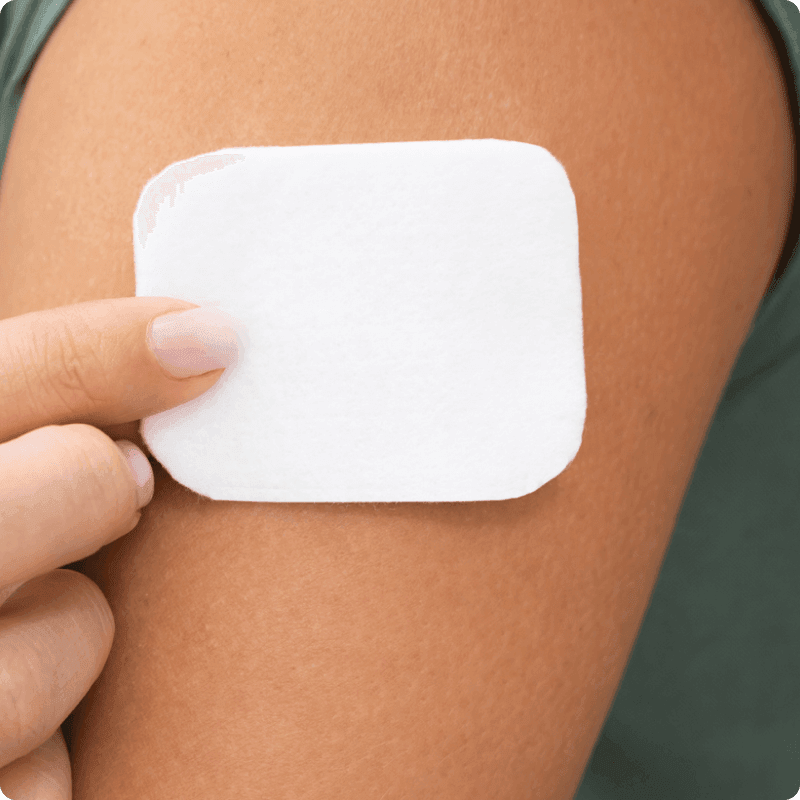Menopause is a natural stage of life that every woman who has periods goes through. It signals the end of your reproductive years as your ovaries stop releasing eggs. However, the symptoms of this transition can have a significant impact on your body, your emotions and your life.
Hormone replacement therapy (HRT) is a form of medication that replaces the hormones that decrease during menopause to help manage its symptoms. There are different forms of HRT and two that often get confused are body identical hormone replacement therapy and bioidentical hormone replacement therapy.
To clear things up and give you the right information so that you can make an informed choice, this guide looks at the differences between body identical HRT and bioidentical HRT.
What is bioidentical HRT?
The term ‘bioidentical hormones’ refers to compounded hormonal treatments that are the precise duplicates of hormones that are made in the human body, e.g. oestrogen, progesterone and testosterone. These hormones are typically derived from plant sources, like yams or soy, and are marketed as being "natural" or tailored to each individual’s needs. They are often made by specialist pharmacies that prepare custom doses using various methods.
However, in the UK, these compounded bioidentical hormones are not regulated by the Medicines and Healthcare products Regulatory Agency (MHRA). This lack of regulation raises concerns about the safety and consistency of these treatments, as their quality, dosage, and effectiveness are not guaranteed. Additionally, they haven’t undergone the rigorous testing and clinical trials that licensed medications are required to pass, meaning their long-term safety is questionable.
What is body identical HRT?
Like bioidentical HRT, body identical HRT is chemically identical to the hormones a woman’s body naturally produces and is made from plants, but the key difference is that body identical HRT is strictly regulated. So, body identical HRT can be considered a form of bioidentical HRT but a fully licensed and controlled type.
Body identical HRT is manufactured by large pharmaceutical companies where the processes and dosages are controlled and undergo stringent quality checks and testing. In the UK, body identical HRT is licensed by the MHRA, which means that its safety, quality, and efficacy are thoroughly tested and monitored. Body identical HRT is considered the safest and most regulated type of HRT and is recommended by the National Institute of Health and Care Excellence (NICE). Further, in addition to more traditional HRT regimes, The British Menopause Society recommends the use of ‘body identical’ hormone replacement therapy (i.e. regulated bioidentical hormones).
HRT vs bioidentical and body identical HRT: what’s the difference?
Traditional hormone replacement therapy (HRT) often uses hormones derived from animal sources, such as oestrogen extracted from the urine of pregnant horses (known as conjugated equine oestrogens). These types of hormones do not match exactly with the hormones naturally produced by the human body, which is why they are sometimes referred to as ‘non-body identical’.
Traditional HRT has been around for decades and is available in a variety of forms, such as tablets, patches, and creams. While this treatment has been effective for many women, it is rarely prescribed nowadays, with body identical HRT being favoured by medical professionals.
What are the side effects of bioidentical HRT?
Compounded bioidentical HRT has several potential side effects, many of which are difficult to predict due to the lack of regulation and reporting. Common side effects may include:
- Irregular hormone levels: Because bioidentical HRT is unregulated, there may be inconsistencies in hormone dosage, leading to symptoms of hormone imbalance, such as mood swings, headaches, and fatigue.
- Skin reactions: If applied as a cream or gel, bioidentical hormones can sometimes cause skin irritation or allergic reactions.
- Lack of monitoring: Without proper regulation, there is a higher chance of over- or under-dosing, which can cause various issues, including weight gain, bloating, or insomnia.
Other side effects may include:
- Acne
- Blurred vision
- Breast tenderness
- Cramping
- Diarrhoea
- Increased facial hair
- Leg cramps
- Nausea
- Spotting
- Vaginal bleeding
What are the side effects of body identical HRT?
Body identical HRT, which is regulated and licensed in the UK, has undergone extensive testing, meaning the side effects are well-documented. Many women have mild or no side effects at all but for those that do experience side effects, most improve within the first three months of treatment.
Common body identical HRT side effects include:
- Abdominal pain
- Acne
- Breast pain or tenderness
- Changes to your period
- Diarrhoea
- Dizziness
- Hair loss
- Headaches
- Leg cramps
- Mild rash, itching or skin irritation
- Mood changes
- Nausea
- Tiredness
- Thrush
- Unusual hair growth
- Vaginal bleeding or spotting
- Vaginal discharge
- Weight changes
What are the risks of bioidentical HRT?
As bioidentical HRT is unregulated, the nature and severity of its risks are not fully known.
There are concerns that some of the hormones used in these compounded preparations, such as dehydroepiandrosterone (DHEA) and pregnenolone, are not suitable for women. Many women are also given progesterone creams as opposed to tablets that can be swallowed but progesterone is not usually well absorbed this way.
Further worry lies in the fact that the amount of oestrogen in oral bioidentical HRT may not be consistent, which can lead to an increased risk of blood clots in the veins and endometrial cancer.
Other research indicates that women who took bioidentical hormone replacement therapy pellets had adverse reactions, indicative of hormone overdose. Side effects including mood swings, breast tenderness, weight gain, acne, hair pattern changes and abnormal blood lipid levels were of higher prevalence in women taking non-regulated bioidentical HRT compared to those taking an approved product.
What are the risks of body identical HRT?
The risks of taking body identical HRT are very low and are usually outweighed by the benefits. Risks of body identical HRT include:
- Breast cancer: There is a link between HRT and breast cancer, albeit a small one. There are around five extra breast cancer cases in every 1,000 women who take combined HRT for five years. However, the risk falls again once a woman stops taking it.
- Blood clots: Body identical HRT tablets can slightly raise your risk of blood clots. HRT patches, spray and gel do not increase the risk of blood clots.
- Stroke: HRT tablets can also slightly increase the likelihood of stroke. However, the risk is still very low.
Types of body identical HRT
There are many [types of body identical HRT] which contain oestrogen, progesterone and sometimes, testosterone. Depending on your medical history and menopause symptoms you may be prescribed oestrogen only or a combination of oestrogen and progesterone. There are various ways that HRT can be administered including tablets, patches, creams, spray, gel, pessaries and vaginal rings. Body identical HRT brands include:
- Oestrogen tablets, patches, gel and spray
- Tablets: Elleste Solo, Progynova and Zumenon
- Patches: Estraderm, Estradot, Evorel, Femseven and Progynova
- Gel: Oestrogel and Sandrena
- Spray: Lenzetto
- Vaginal oestrogen
- Vaginal tablets: Gina, Vagifem, Vagirux
- Vaginal ring: Estring
- Vaginal pessaries: Imvaggis
- Vaginal gel: Blissel
- Vaginal cream: Ovestin
- Micronised progesterone
- Utrogestan
- Gepretix
- Continuous combined HRT
- Tablets and capsules: Bijuve, Elleste Duet Conti, Femoston-conti, Indivina, Kliofem and Kliovance
- Patches: Evorel Conto and FemSeven Conti
- Sequential combined HRT
- Tablets:Elleste Duet, Femoston, Novofem, Tridesta and Trisequens
- Patches: Evorel Sequi and FemSeven Sequi
Is bioidentical HRT available on the NHS?
Bioidentical hormones are sometimes offered by private clinics. However, as they are not regulated by the MHRA and their safety and side effects aren’t known, bioidentical HRT treatments are not available on the NHS.
Is body identical HRT available on the NHS?
Yes, body identical HRT is available on the NHS. This is because they have been rigorously tested and their effectiveness and side effects are well documented.
They can also be prescribed by private GPS and clinics. In addition to traditional regulated oral HRT preparations, at Menopause Care we prescribe body identical hormones only. This includes oestrogen delivered through the skin (transdermal preparations) in the form of patches, gels and sprays.
We use body identical progesterone in the form of micronised progesterone (Utrogestan). We can also prescribe body identical testosterone (off-licence, but regulated, as per guidelines).
Our specialist menopause doctors and nurses have a wealth of knowledge about menopause symptoms and an in-depth understanding of how body-identical HRT can effectively manage them. If you’d like to discuss your options for HRT treatment, book a consultation with a Menopause Care doctor.





